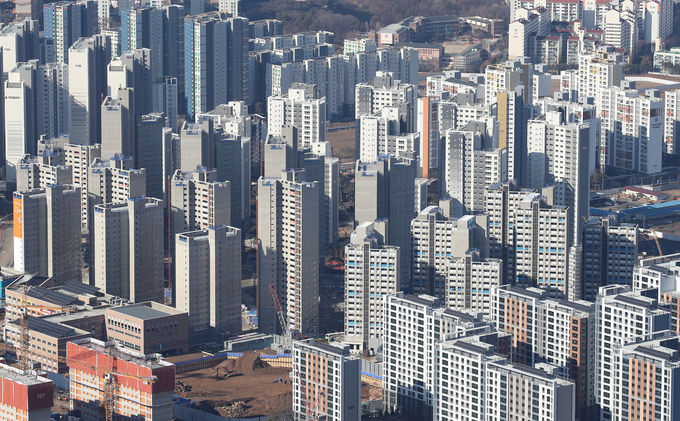![경기도 남한산성에서 바로 본 위례신도시 아파트단지 모습.[사진=연합뉴스]](https://i0.wp.com/www.youthdaily.co.kr/data/photos/20210104/art_16118176182561_c383b4.jpg?w=560&ssl=1)
【Youth Daily 】The government has announced that it will come up with a special housing supply plan from the new year, but the weekly increase in apartment prices in the metropolitan area has hit a record high since last week, leaving the real estate market unstable.
In particular, apartment prices in Gyeonggi-do recorded the highest increase in nine years. This is due to the effects of successive traffic concessions, such as the extension of the subway and the establishment of a new GTX station.
According to the Korea Real Estate Agency (formerly the Korea Appraisal Board) on the 28th, the 4th week of January (as of the 25th) nationwide apartment sales prices rose 0.29% to the same rate as last week.
In particular, apartment prices in the metropolitan area rose 0.33% to the highest since May 2012, when the Real Estate Agency started preparing related statistics following last week (0.31%).
Among them, the economy rewrote the record high rate of increase, increasing from 0.42% last week to 0.46% this week.
At the end of last year, the Ministry of Land, Infrastructure and Transport confirmed measures such as extending the subway line 9, new Goyang Line, and new Changneung Station on the GTX-A line to expand the transportation network of the third new cities such as Wangsuk in Namyangju and Changneung in Goyang. .
Namyangju City rose 0.96% this week, showing the highest rate of increase in the economy. This year, the cumulative increase rate over the four weeks reached 3.08%.
Goyang City also rose 0.87% this week, resulting in a cumulative increase of 3.85% over the four weeks.
Uiwang-si (0.91%), Yangju-si (0.71%), Uijeongbu-si (0.68%), Gunpo-si (0.63%), Giheung-gu, Yongin (0.62%), Bundang-gu, Seongnam (0.46%), and Ansan (0.45%) also continued high rates of increase.
Incheon’s growth slowed from 0.40% last week to 0.35% this week, with a large increase mainly in Yeonsu-gu (0.52%) where Songdo new town is located, Seo-gu (0.40%) and Michuhol-gu (0.37%) where Geomdan New Town is located.
Apartment prices in Seoul rose 0.09%, showing the same rate as last week.
Seoul apartment prices increased weekly to 0.03%, 0.04%, 0.05%, and 0.06% for the first to fourth weeks of December last year, and 0.06%, 0.07%, 0.09%, and 0.09% for the first to fourth weeks of January this year. As a result, the uptrend is not declining.
The Real Estate Agency said, “Amidst high buying sentiment due to low interest rate liquidity and rising jeonse prices, there is anticipation for maintenance business, or apartment prices have risen mainly due to station areas, new complexes, and relatively undervalued complexes.”
In Seoul, Songpa-gu, mainly in Jamsil-Sincheon-dong apartments and Bangi-dong reconstruction complexes, rose 0.17%, the highest rate of increase following last week (0.18%).
Gangnam-gu (0.11% → 0.11%) led to the Apgujeong-dong redevelopment complex and Daechi-Yeoksam-dong, Gangdong-gu (0.11% → 0.10%) led to Amsa and Godeok-dong, and Seocho-gu (0.10% → 0.09%) led to the Banpo-dong redevelopment complex. However, in these regions, the overall growth rate decreased due to a decrease in the buying trend.
In other regions south of the Han River, Dongjak-gu (0.09%→0.12%) led to Noryangjin and Heukseok-dong, which are affected by redevelopment, and Gwanak-gu (0.09%→0.09%), led to Bongcheon and Sillimdong.
Mapo-gu (0.11%→0.13%), Dongdaemun-gu (0.15%→0.12%), and Gangbuk-gu (0.10%→0.11%) showed high rates of increase in the northern area of the Han River.
The province’s gains declined from 0.26% last week to 0.25% this week.
The five metropolitan cities excluding Incheon showed a slowdown from 0.33% to 0.31%, and the eight provinces excluding Gyeonggi-do from 0.20% to 0.19%.
By city and province, Daejeon (0.40%) rose significantly after Gyeonggi (0.46%), and Daegu (0.38%), Incheon (0.35%), Busan (0.33%), Chungnam (0.32%), and Ulsan (0.31%) ), Gyeongbuk (0.30%), Sejong, Gyeongnam, Gangwon (0.20%), and so on.
Apartment rental prices across the country declined slightly from 0.24% last week to 0.23% this week.
Seoul rose 83 weeks in a row, and after finishing a sideways movement (0.13%) for four consecutive weeks until last week, the increase narrowed to 0.12% this week.
In Seoul, five districts including Dongdaemun (0.08%→0.09%), Seongbuk (0.15%→0.16%), Gangbuk (0.06%→0.13%), Yangcheon (0.09%→0.12%), and Gwanak (0.10%→0.13%) Compared to the previous week, and the remaining 20 districts reduced the increase.
In the case of Seoul, the real estate agency analyzed, “In the case of Seoul, the rise is continuing in the middle and low-priced complexes in popular districts in the metropolitan area, but in some areas where the rental price was high, the extent of the increase in prices decreased as sales accumulated.”
The total price of the metropolitan area rose 0.22%, maintaining the same rise as last week. The economy rose from 0.25% last week to 0.27% this week, while Incheon decreased from 0.30% to 0.29%.
In Gyeonggi-do, Namyangju (0.65%), Uijeongbu (0.62%), Yangju (0.56%), and Seongnam Bundang-gu (0.40%) saw a significant increase, while Incheon rose mainly in Seo-gu (0.37%) and Yeonsu-gu (0.36%). .
The rent for apartments in the provinces rose 0.24%, reducing the rise compared to the previous week (0.25%).
Daejeon (0.48%→0.50%) and Daegu (0.25%→0.28%) increased the increase, while Sejong (1.17%→1.02%), Ulsan (0.40%→0.37%), and Busan (0.33%→0.29%) And Gwangju (0.15% → 0.09%), etc., decreased the extent of the increase.
【Youth Daily = Reporter Lee Seung-gu】
